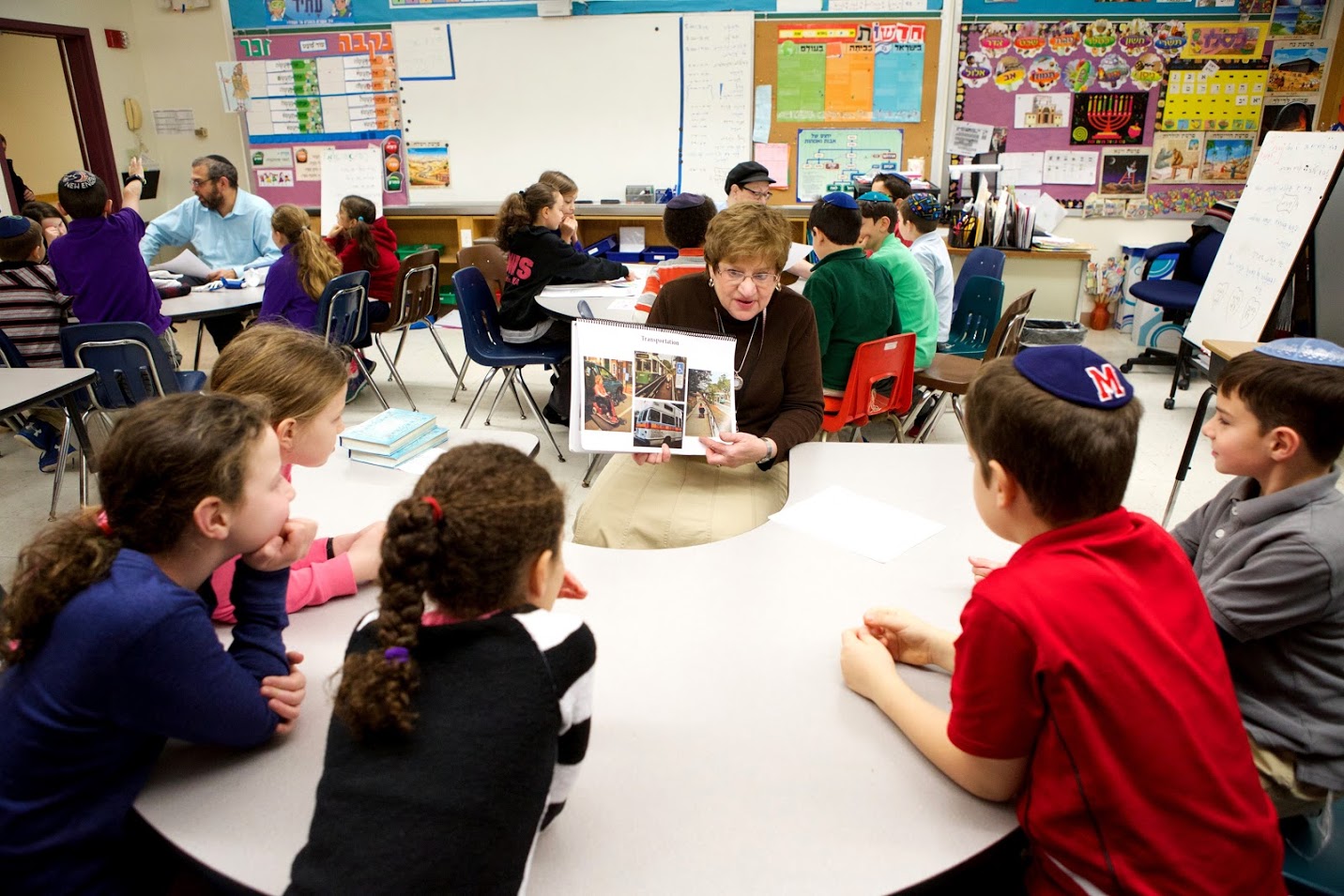
Shaping a New Generation of Ambassadors for Inclusion
This piece was written by Gary Alpert, Program Director for Ambassadors for Inclusion.
Recently, as I was concluding a Jewish day school visit, I noticed an entire class of 5th grade students giving high-fives to a 1st grader as they passed one another in the hallway. Though I’ve spent more than 30 years as a speaker, educator and after-school director in elementary schools, this is not a sight I see often. As I watched the students warmly greeting one another, I reflected back to the morning’s Gateways/Understanding Our Differences 5th grade classroom curriculum presentation.

photo credit: Gateways
Gateways is a Boston-based organization that works to ensure that students of all abilities have access to a Jewish education, and we have teamed up with the Ruderman Family Foundation and Understanding Our Differences (UOD), which has developed an award winning, interactive disability awareness curriculum, to teach children to “see the person and not the disability.” Students learn about a range of disabilities through PowerPoint presentations and hands-on activities. At the end of each unit, a guest with that particular disability speaks to the class about his or her experience. While the presentations and activities are compelling and informative for the students, the guest speaker is, in my experience, always a highlight of the units. This particular day was no exception.
In this unit, the 5th graders had been learning about diabetes: how sugar affects the body, how to balance a meal with exercise and insulin and how to live with the disease. Their guest speaker was not an adult who had lived with diabetes for decades—instead, it was an excited 1st grader who had recently been diagnosed with the condition. This student was asked if he would be willing speak to the 5th grade about his experience with diabetes, and with help from his parents and teachers, he worked hard on creating a speech to present.
The 5th graders were crammed into chairs, draped over desks and sprawled out on the carpet as they waited patiently for the 1st grader to start speaking. I joined his teachers and parents at the back of the room and watched him collect the notes he had been practicing for weeks. He took a deep breath and, his voice shaking, started speaking about his experience with diabetes: how his parents found out he had the disease, what it had meant for his family, the countless visits to hospitals and doctors. He told the class about how his parents woke him several times each night to check his blood and make sure he had enough insulin. The 5th graders watched, wide-eyed and captivated, as he took out his insulin pump, projected it onto the big screen and explained how the device worked.

photo credit: Gateways
After he finished his presentation, the students had thoughtful and profound questions for their new friend. They wanted to know if it hurt to have his blood tested, and if he could feel the insulin in his body. They were curious if he could play sports and participate in the same kinds of extracurricular activities they enjoyed in their daily lives. For more than half an hour, I watched as the 1st grader answered every question the 5th graders asked, and responded to comments and delighted in their shared interests and experiences. After the conclusion of his presentation, the whole 5th grade exuberantly cheered for their guest speaker, who walked back to his classroom full of pride.
Each day, we aim to teach our children to treat one another according to b’tzelem elohim: To remember that we are all unique beings with infinite value in our society. This is a tall task. But now, with the help of the Ruderman Family Foundation, Understanding our Differences and Gateways, students have the opportunity to engage in thoughtful dialogue, break down barriers, build relationships, find commonalities, appreciate differences and, ultimately, see the unique and tremendous value that each person brings to the world.
We have a long way to go before all students feel fully included. If students with disabilities are to feel embraced by the day school world, we must first break down attitudinal barriers. In many day schools, there are students with learning disabilities, asthma, allergies and diabetes; but it is rare to see a student who is in a wheelchair or who is blind or Deaf. Part of our work involves exposure and building a better understanding. But that can only be built over time.
The AFI initiative is wholly new in scope and breadth, and it is the only program of its kind to target students in grades K–12. As we gather more data, it will be valuable to study whether these students, as they grow and mature, are more open and accepting of all people. UOD’s decades of work in grades 3–5 and the reflections of now-adult participants in that program indicate that these are experiences that shape individuals over a lifetime. And when I think of the smile on that 1st grader’s face as an entire class full of 5th graders gave him high-fives in the hallway, I know that we are making a difference, one student at a time.
This guest piece was contributed by Gary Alpert, Program Director for Ambassadors for Inclusion, Gateways: Access to Jewish Education. The Understanding Our Differences curriculum is one facet of the Ambassadors for Inclusion (AFI) Program, a joint initiative of Gateways: Access to Jewish Education and The Ruderman Family Foundation. The program teaches students in Jewish day schools and congregational schools, from kindergarten through high school graduation, to understand, respect and speak thoughtfully about differences. AFI is designed to expose students to continuous, developmentally-appropriate messages about disability awareness and advocacy in order to foster more inclusive Jewish communities. The program is the first of its kind nationally to address students in multiple Jewish educational environments, in grades K-12.
About the author Justin Ellis is the Social Media Coordinator of the Ruderman Family Foundation who was first connected to the issue of disability through his sister, an award-winning special education teacher. Outside the Foundation he is an avid lover of Middle Eastern history and communication psychology.
Stay Included
To stay up to date on our most recent advocacy efforts, events and exciting developments, subscribe to our newsletter and blog!



















